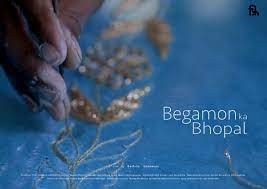Rachita Gorowala’s film recreates a time when Bhopal was ruled by women.

First published: https://www.thehindubusinessline.com/blink/watch/under-begums-orders/article24829173.ece
Under Begum’s orders
No fewer than four generations of women ruled Bhopal. A short film unearths their stories and the impression their distinctive royal writ left on the city
Growing up in Bhopal, filmmaker Rachita Gorowala’s daily route to school ran past a darwaza (gateway) of Shaukat Mahal. The palace — built in the 1830s with French, Mughal and English influences — was a wedding gift for Begum Sikander, one of the first few woman rulers of Bhopal. The image of this bygone yet integral feature of her hometown had embedded itself in Gorowala’s psyche.
It was reminiscent of an era when the city was ruled by women. Years after education and work took Gorowala places, the memory continued to tug at her and she returned to delve deeper into this unique aspect of the city’s history. She decided to recreate the regal past through her short film Begamon ka Bhopal, which was released in December 2017 and is currently touring the country with public screenings.
“Bhopal had four generations of women rulers, who were Muslims from Pathan families. I was really fascinated with their story,” she says after a screening of the film in Mumbai.
“The seeds were sown during my many trips to the old city — the air is stifling, nothing seems to move and you are usually drenched in sweat. At the same time, the architecture is distinct, very syncretic. This is my memory of the Bhopal of the begums.”
The 27-minute film gradually slips into the genre of poetic realism, even though Gorowala, a graduate of the Film and Television Institute of India, had set ou to make a conventional documentary .
“Our first cut followed the routine storyline, [namely] that the begums were very great… But it evolved from that initial thought — in the film, I am sort of trying to say things, while letting the audience feel them and have the final word,” she says.
What she was finally left with was a poignant reminder of a glorious chapter in Bhopal’s history, relived through the memories of two royal descendants, Firoza Khan and Meeno Ali, the thoughts of the Padma Shri-awardee writer Manzoor Ahtesham, a former royal attendant Zohra Phupo, and the 8mm reels belonging to the grandfather of her family friend, Qazi Salauddin Ahmed, besides Gorowala’s own impressions of the city.
Gorowala chanced upon the vintage footage after a casual chat with Ahmed. “In Bhopal, everybody knows everybody and he was happy to share the footage with me. He started pulling out all kinds of stuff — their ghar ka (family) picnic, somebody playing tennis…” she says.
The old sepia-toned reels capture the lavish lifestyle of the royals and their opulent surroundings, which today lie in a state of decrepitude, even as the city continues to grow around it.
However, not much has changed for the former royals such as Firoza, who revels in the glory of past days through her rituals, all of which the film has captured beautifully — whether it’s dressing up daintily by the mirror or cutting betel nuts and wrapping her own paan, as if trying to hold on to a past that has long been consigned to the pages of history. Then there are the songs she croons on screen, which momentarily take her back to a time when royals lived each day to the fullest. The film breathes life into the Persian word huzun — which refers to nostalgia that is impossible to describe, and can only be felt.
After a hundred cuts that saw the editing process extend to a year and a half, Gorowala and her editor, Sandra Dias, finally decided on what they wanted to showcase. At the premier in Bhopal in December last year, the film took the gathering back in time.
The film ends with lines that sum up the essence of the begums and the air of femininity they lent to Bhopal under their guiding light.
“Is ehsaas main ek meetha sa dukh hai. Itne chehere jinke saath aap uthete baithte, woh aawazein, khooshbooein, woh ehsaas, sab khatam. Lekin fir yeh lagta hai, tum to ho (There is a sweet pain in knowing that the many faces you grew up with, those voices, fragrances, feelings… all have vanished. But then, there is still you).”
“I remember my leading lady, Firoza, saying, Shuru hote hi khatam ho gayi (It seemed to end even before it had begun). It’s a very common opinion I’ve been hearing since that evening, with most saying it could have been a longer film,” Gorowala says.
While interviewing more than 300 people over a year’s time for her research, Gorowala had stumbled upon the personal, unpublished diary of Ahtesham, with whom she formed a lasting bond and who graciously allowed her to include lines from it in the film.
“It had very personal stuff, in terms of his thoughts and insecurities,” Gorowala says. “Each person had a legacy to share… there may be a sense of loss in the film, but there is also a lot of grace in the life they lead today.”